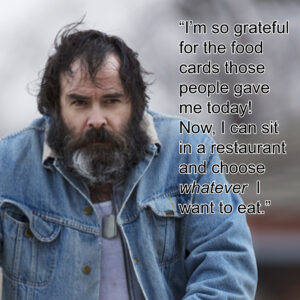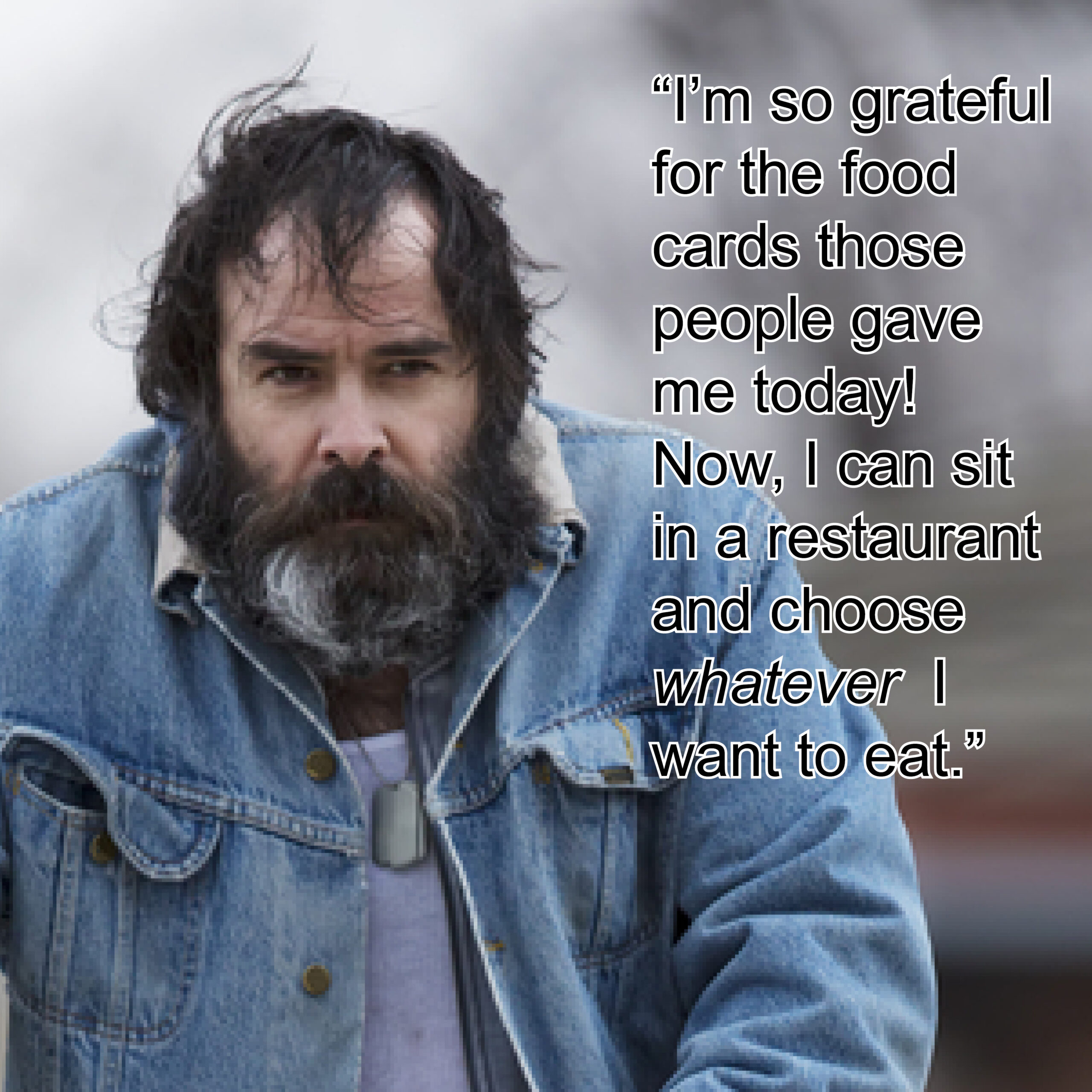By Jeremy Reynalds, Ph.D.
Founder and CEO
Joy Junction Inc.
Some Comfort on a Soggy Day
 It was the beginning of the regular monsoon time in Albuquerque on a recent Friday afternoon.
It was the beginning of the regular monsoon time in Albuquerque on a recent Friday afternoon.
Driving through a light rain in Albuquerque on a recent Friday afternoon, we spotted this tall, sad looking guy with a small sign, about to become very bedraggled, close to I40 and Carlisle. While beckoning him over to our car, my wife Elma reached for a couple of fast food gift cards. He made his way over and we rolled down the window, hoping the light would stay red long enough for the transaction to be successfully completed.
Elma gave him the cards, explaining that he could get whatever he wanted, like a hamburger, fries and a cup of coffee.
“Anything?” he said.
“Yes,” we both responded.
He appeared overwhelmed. “Oh, thank you,” he said his eyes beginning to fill with tears.
We were also close to crying. Driving off, Elma looked at the guy. He put the cards away carefully in his wallet.
I don’t know whether we’ll ever see that man again, but I was thinking about him a lot over the last couple of days.
We do tend to stereotype many homeless people, and especially panhandlers, don’t we? Fear, anecdotal tales, and the mess left behind by many addicted panhandlers play a large part in that. Concerned residents, understandably upset business owners and those who have been accosted by overly aggressive panhandlers call local media to draw attention to the used syringes, condoms and more- often left behind wherever some (addicted) panhandlers gather.
And I have no doubt that a number of those “flying a sign” around Albuquerque are begging to feed an addiction. Of course, it’s highly doubtful whether they’re making even a fraction of the amount of money that you may have heard in some anecdotal tales that make their way around the Internet.
But back to “Richard.” I’ll call him that. It humanizes him, rather than just referring to him as “a panhandler.”
Richard had a mother and a father, and perhaps brothers and sisters. Maybe they loved him, and maybe they didn’t. I’m guessing he went to school, and during his formative years he had dreams of what he wanted his life to be.
What happened along the way to derail his life’s dreams? You can be sure he didn’t envision standing on an Albuquerque sidewalk on a wet Friday afternoon begging for money. Does this perhaps make you see Richard-and other panhandlers-in a slightly different light?
A woman responding to an article I recently posted about the reason panhandling bans are being struck down across the country had the right idea.
She said that recently she saw an overtly tattooed with a crippled leg begging on the street. She hopped out of her car and gave him $7-not a usual gesture, as she said she rarely carries money on her.
“I gave him a hug and told him that God loved him. The man started to cry. By that time traffic was starting to back up, and I told him again that God loved him and never give up. He said he was a veteran and had been in Afghanistan two tours, I thanked him, gave him another hug and left.”
She added, “Under normal circumstances, we would have passed each other in the street and never even said hello. I don’t care if he has an addiction or is an alcoholic. Most of us (are) probably be on something just be able to get through the day. To judge a homeless person is to judge Jesus. Who the hell am I to judge or you for that matter?
“Do what you want with the street panhandlers and I will continue to do what I usually do.”
Proposed Ordinance Sees Things Differently
But Albuquerque City Councilor Trudy Jones has a different idea and it’s producing both dire and warnings from the homeless if her proposed anti-panhandling ordinance eventually becomes law.
Jones is a determined woman. Her determination is laser focused on panhandling-a common sight all over Albuquerque.
She’s working on a public safety and median ordinance, which if ready will be heard by the next city business and finance committee meeting in early Sept. If successful, it would then go to the city council, where its passage would have a huge impact on panhandling and other forms of solicitation.
In a recent meeting with Joy Junction staff, Jones said, “We can only help people who want to be helped, and we cannot allow this to keep degrading our city … We have to take our streets back. We have to … retake control of our city, and if that means they go to Tucson, or Phoenix, or Dallas, or Colorado where the drugs are cheaper, so be it.”
A call to the mayor’s office in Denver for comment was not immediately returned.
When asked their opinion on this proposed ordinance, a few Joy Junction guests were quick to respond with dire consequences if it becomes law. They said that drug addicts or alcoholics are going to satisfy their habit one way or the other, and if panhandling is declared illegal they will resort to stealing, robbing and shoplifting. People then start getting hurt.
Others said that unfortunately many panhandlers do get arrested, which in turn puts them in the legal system and also overcrowds the jail. They creatively added that if you allow the community to help the homeless with a hand out every now and then, it in turn benefits local government by keeping the homeless out of the system or jail.
Joy Junction also hit the streets Friday to see what a few panhandlers thought about Jones’ proposal.
One man who appeared to be in his mid-60’s said he doesn’t know what he’ll do if Jones’ proposal is successful. He added that he has a heart condition preventing him from working and currently lives in his car.
Another man, in his early 60’s, was clean, dressed well, and well spoken. He said his house had been broken into during an extended hospital stay, and his landlord kicked him out because he was unable to pay for repairs needed to the house after the break in. He’s panhandling because of his current situation, and said he would keep doing it-illegal or not. He is expecting a government disability check soon.
A woman, 51, said she has medical conditions that don’t allow her to work, and while her kids help her when they can, they also have limited income.. She said her kids help her when they can, but they have limited income too. She is working on being declared officially disabled, so she can start the long process to collect benefits.
She added that she’s been on a housing waiting list for eight months, and feels she’s at the bottom of the list because of the lack of official disability.
If panhandling is declared illegal, she would quit because she doesn’t want to break the law, adding that she would probably end up dying.
While I understand there need to be some workable solutions to the panhandling issue, kicking the homeless issue out of town is not the answer.
“City residents need to understand that this is not just a government issue. The responsibility falls on all of us, and there needs to be a community conversation – not just a ‘not in my back yard’ response. We’d like to keep them alive so they can get help.”
There also needs to be a larger detox center than the one currently available to help alleviate some of the problem.


